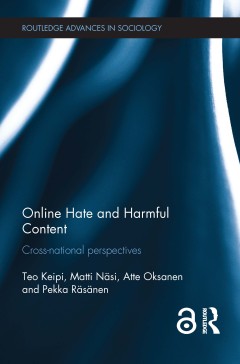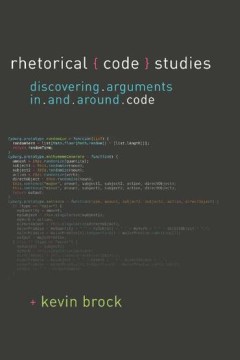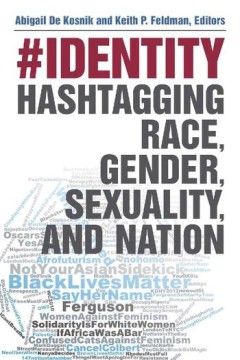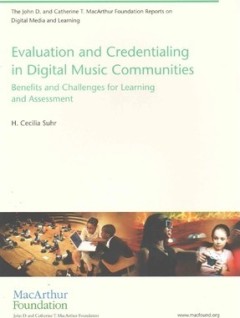Filter by

The ethics of cybersecurity
This open access book provides the first comprehensive collection of papers that provide an integrative view on cybersecurity. It discusses theories, problems and solutions on the relevant ethical issues involved. This work is sorely needed in a world where cybersecurity has become indispensable to protect trust and confidence in the digital infrastructure whilst respecting fundamental values l…
- Edition
- -
- ISBN/ISSN
- 9783030290535
- Collation
- xvii, 384p. : ill.
- Series Title
- -
- Call Number
- 005.8 ETH e

Online hate and harmful content : cross-national perspectives
Over the past few decades, various types of hate material have caused increasing concern. Today, the scope of hate is wider than ever, as easy and often-anonymous access to an enormous amount of online content has opened the Internet up to both use and abuse. By providing possibilities for inexpensive and instantaneous access without ties to geographic location or a user identification system, …
- Edition
- -
- ISBN/ISSN
- 9781315628370
- Collation
- x, 143p. : ill.
- Series Title
- -
- Call Number
- 302.3 ONL o

Social networks with rich edge semantics
Social Networks with Rich Edge Semantics introduces a new mechanism for representing social networks in which pairwise relationships can be drawn from a range of realistic possibilities, including different types of relationships, different strengths in the directions of a pair, positive and negative relationships, and relationships whose intensities change with time. For each possibility, the …
- Edition
- -
- ISBN/ISSN
- 9781315390628
- Collation
- xx, 210p. : ill.
- Series Title
- -
- Call Number
- 302.3015118 ZHE s

Rhetorical code studies : discovering arguments in and around code
Winner of the 2017 Sweetland Digital Rhetoric Collaborative Book Prize Software developers work rhetorically to make meaning through the code they write. In some ways, writing code is like any other form of communication; in others, it proves to be new, exciting, and unique. In Rhetorical Code Studies, Kevin Brock explores how software code serves as meaningful communication through which softw…
- Edition
- -
- ISBN/ISSN
- 9780472131273
- Collation
- xvii, 213p. : ill.
- Series Title
- -
- Call Number
- 005.13 BRO r

#Identity : hashtagging race, gender, sexuality, and nation
"Since its launch in 2006, Twitter has served as a major platform for political performance, social justice activism, and large-scale public debates over race, ethnicity, gender, sexuality, and nationality. It has empowered minoritarian groups to organize protests, articulate often-underrepresented perspectives, and form community. It has also spread hashtags that have been used to bully and …
- Edition
- -
- ISBN/ISSN
- 9780472074150
- Collation
- xi, 365p. : ill.
- Series Title
- -
- Call Number
- 302.30285 HAS h

Playful mapping in the digital age
From Mah-Jong, to the introduction of Prussian war-games, through to the emergence of location-based play: maps and play share a long and diverse history. This monograph shows how mapping and playing unfold in the digital age, when the relations between these apparently separate tropes are increasingly woven together. Fluid networks of interaction have encouraged a proliferation of hybrid forms…
- Edition
- -
- ISBN/ISSN
- 9789492302137
- Collation
- 156 p.
- Series Title
- Theory on Demand
- Call Number
- 006 PLA p

Evaluation and credentialing in digital music communities : benefits and chal…
An examination of the use of digital badges as a reward for both casual online music evaluators and professional musicians.Professional and amateur musicians alike use social media as a platform for showcasing and promoting their music. Social media evaluation practices—rating, ranking, voting, “liking,” and “friending” by ordinary users, peers, and critics—have become essential pro…
- Edition
- -
- ISBN/ISSN
- 9780262527149
- Collation
- vii, 102p. : ill.
- Series Title
- -
- Call Number
- 780.2854678 SUH e
 Computer Science, Information & General Works
Computer Science, Information & General Works  Philosophy & Psychology
Philosophy & Psychology  Religion
Religion  Social Sciences
Social Sciences  Language
Language  Pure Science
Pure Science  Applied Sciences
Applied Sciences  Art & Recreation
Art & Recreation  Literature
Literature  History & Geography
History & Geography